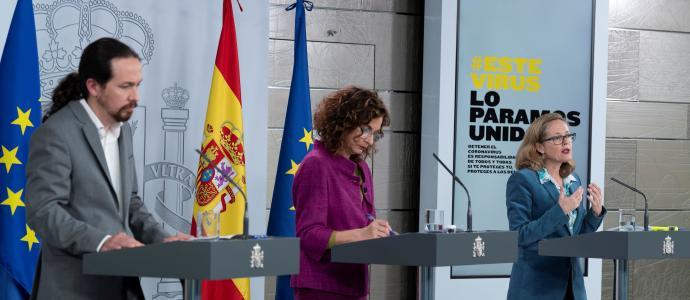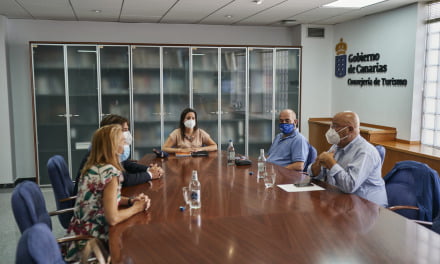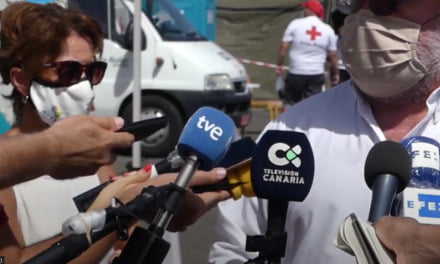 The Council of Ministers (The Spanish Cabinet) have this Tuesday approved a law by royal decree that aims to extend all the measures already implemented to help mitigate the impact of the Covid-19 crisis by keeping the assistance in place for at least one month beyond the end of the state of emergency, except for those measures with a specific end date, and has approved more than 50 new measures regarding rent, a moratorium on quotas for self-employed workers and SMEs and on a subsidy for those with temporary employment contracts as well as domestic workers, among others, who have been dismissed. They say they hope to “very soon” have economic revival plans in place to return momentum to Spain.
The Council of Ministers (The Spanish Cabinet) have this Tuesday approved a law by royal decree that aims to extend all the measures already implemented to help mitigate the impact of the Covid-19 crisis by keeping the assistance in place for at least one month beyond the end of the state of emergency, except for those measures with a specific end date, and has approved more than 50 new measures regarding rent, a moratorium on quotas for self-employed workers and SMEs and on a subsidy for those with temporary employment contracts as well as domestic workers, among others, who have been dismissed. They say they hope to “very soon” have economic revival plans in place to return momentum to Spain.
The new measures were announced this afternoon via video press conference, following the Council of Ministers meeting, by the Government spokesperson and Finance Minister, María Jesús Montero, the Vice President and Minister for Social Rights and the 2030 Agenda, Pablo Iglesias, and the Third Vice President for Economic Affairs and Digital Transformation Nadia Calviño, who together highlighted this second “shield” against Covid-19 which aims to protect in “the best way possible” the most vulnerable.
The raft of rent measures are expected to be of most help to some 500,000 vulnerable families and includes the suspension of evictions for the at least six months after the end of the state of emergency, an extraordinary six-month extension to all regular home rental contracts, a line of micro-credit, guaranteed by the Spanish State or the possibility of direct aid of up to €900 following the crisis, among others, in total amounting to a €700 million package.
This was announced at a video press conference following the Council of Ministers meeting, with government spokeswoman, María Jesús Montero, and the third vice president, Nadia Calviño, joined by vice president for Social Rights and the Agenda 2020, Pablo Iglesias , in which they detailed the new measures in the Executive’s shock plan against the economic impact of Covid-19.
Iglesias highlighted that the measures seek to offer security and protection to all people who face the negative impact of the crisis and underlined the measures protecting the “constitutional right” to housing, as a “more essential” asset now as it is the “trench” from which citizens protect themselves from the virus, after asking them to stay home to avoid infection.
Specifically, the suspension of evictions without a housing alternative has been approved for at lest six months after the end of the state of emergency so that “no one is left homeless during the crisis”, as well as an extraordinary six-month extension to all rental housing contracts to avoid abusive rent rises, taking advantage of the Covid-19 crisis.
In addition, they indicated that, in accordance with the approved royal decree-law, anyone who falls into a vulnerable situation can apply for micro credit, with zero interest, to be repaid over 6 years, expandable to 10 years in cases of extreme difficulties.
A “very broad” definition of what amounts to “vulnerability” has been put forward to help people in need take advantage of the new measures, together with facilities for the return of the same credits, which will allow a “large number” of people with difficulties to take advantage of the new measures including the unemployed, workers on temporary suspension due to ERTE regulations stopping their employers business or requiring much reduced hours, or indeed for self-employed workers with reduced income as a consequence of Covid-19.
Up to €900 in state aid
For those who will still be struggling after the crisis, the Spanish State will cover rents through a public aid fund that includes up to €900 per month rent as well as up to €200 for supplies or maintenance expenses, with a total fund of up to €700 million to be used.
“If there is a situation [during this crisis] in which there are tenants in vulnerable situations who, after receiving loans at zero cost, cannot pay, the State will not leave them stranded and will take care of guaranteeing that nobody can be expelled from their home for not paying the rent,” ministers insisted.
Asked about requests for rent-forgiveness and the proposals from Unidas Podemos, Pablo Iglesias said that “a lot” has been worked in by “many ministries” to try and create a decree that protects the most vulnerable families who may be unable to pay rent or pay back any credit. “That should fill us all with pride” Iglesias stressed.
As for the number of beneficiaries, he indicated that, pending the completion of the minimum vital income with which the Ministry of Social Security is working to help some 5 million potential beneficiaries, the approved rental measures will affect more than half a million families in vulnerable situations.
Large property owners and investment funds
In addition, he emphasised that large property owners “must shoulder their burden and make an effort like everyone else”, along with vulnerable tenants and small landowners.
Therefore, the regulation establishes that they will have to choose between making a 50% write-off or restructuring these debts after 3 years for those who are affected.
The vice president of Spain emphasised that a “key distinction” is included; since “a small owner is not the same as a vulture fund …,a retired couple who receive a low pension together with the rent of an apartment that they bought after a lifetime of work, is not the same as someone with 15 or 20 rented houses or vulture funds with thousands of houses”.
Therefore, the decree guarantees that all small owners will receive “in full” the income from housing while larger property holders and investment funds must assume “as normal” their part of the economic impact, writing off debt or restructuring to help get everything moving again.
Mortgage moratorium
In parallel to the rent measures, the Government has decided to extend the moratorium on mortgage payments for up to three months for those people who have lost their jobs or had their income reduced as a result of the situation generated by the health crisis. [this is not automatic, you need to apply to your mortgage lender]
The third vice-president, Nadia Calviño, stressed that Spanish society is “particularly supportive” and has “very strong” social fabric, for which she sees reinforcement measures as “necessary” to reduce mobility and avoid infections, although she stressed that a “solidarity network” is “the most important thing”, since the Government “cannot replace that network”, but rather support and cover the areas where it does not reach.
“The exceptional measures are [just] that, exceptional “, Calviño pointed out, after evaluating the effort of owners and tenants to reach agreements in the face of the State of Emergency.









